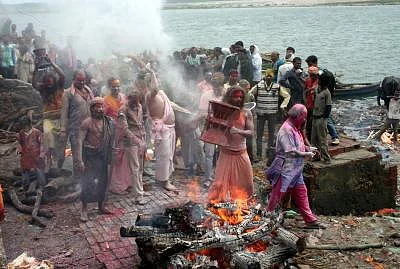By Somrita Ghosh
Varanasi, May 2 (IANS) It was past 10 in the night. Four pyres were aflame at Manikarnika Ghat on the banks of the Ganga here. Gagan Choudhary, a corpse burner, was shifting from one pyre to another as the air reeked of burning flesh and wood -- tinged with alcohol, tobacco and cannabis.
As a mild wind from the sacred river blew over the ghat, flecks of ashes from the burning pyres swirled in the air.
In Hindu custom, it is believed that the path to liberation (moksha) for a soul is attained if the physical body is burnt at death at Manikarnika Ghat.
And Chaudhary, like his daily routine, was jabbing the corpses with a wooden stick one after the other. Moving barefoot, he covered his face with a piece of cloth to protect himself from the heat and ashes.
"This is all we have been taught -- to burn dead bodies. This is what we are good at. We have no hope of education and no scope for improving our standard of living," said Chaudhary, who lives near the ghat in Prime Minister Narendra Modi's Lok Sabha constituency.
Chaudhary belongs to the Dom community which, for generations, has been burning dead bodies. They are generally considered lowest in the caste hierarchy -- even among the Dalits -- and often become victims of untouchability. Dreaming for a better life is unimaginable.
"My father was also into it. He was a heavy drinker and he stopped working. Then I had to take up the profession. It is not that we do it willingly, but something we are forced into.This is our destiny," Chaudhary said.
His eyes were bloodshot and his breath reeked of country liquor. He recalled he was just eight when he started burning corpses and consuming alcohol because he couldn't bear the smell of dead bodies.
"You think it is easy to carry so many dead bodies and burn them every day? I cannot. Nobody can do it unless we consume alcohol or smoke weed," he grinned.
He couldn't say how old he is. "I must be around 26, I guess. I don't have any birth certificate because I didn't attend much of school. And have been doing the same work for 16-17 years now."
His four to five hours of labour fetches him around Rs 300 a day and he is happy with whatever he is earning.
"Rest of the time I manage to either drive a car or pull a rickshaw. But then, I prefer hiding my identity. Not all would appreciate to be served by a Dalit, that too a Dom" he quipped.
A little above where the corpses were being burnt sat Jai Raja Chaudhary. Though also a Dom, in the caste hierarchy he is higher than Gagan Chaudhary. He assembles the other Doms and assigns them the work of corpse burning.
He has a 24-hour working day. This is his family tradition. Jai Raja said that, in his family, every male member spends a whole day at Manikarnika Ghat by turn.
"Our situation can never develop because casteism still is a major factor in India. We are not being allowed to explore opportunities. We are way behind compared to the other Dalits. Our comparison comes within our community. We cannot even imagine competing with those from the upper classes," Jai Raja, 40, said.
He has studied till Class 12 but couldn't continue further because of family pressure. He has three children -- two sons and a daughter -- who attend a government-run school. But he is not sure how long will his kids be able to continue their education.
"Not a single Dom would want their kids to pursue burning corpses as a career. But do we have any other option? We have been exploited over the years and probably the same is going to continue. Upliftment of our status is difficult."
For the Doms, untouchability is still a reality which they face almost every day even in Varanasi where they have been living for centuries. They are abused and humiliated by the upper castes, Jai Raja said.
"We are not allowed to walk in the same lane as used by upper class. They will clean the lanes if we pass by. Shop-owners never hand over cash directly on our palms. They will either keep it aside and ask us to pick up or simply drop it in our palms."
Gagan Chaudhary said he and his contemporaries were ill-treated even by Dalits who claim their social status a notch above them.
"Not just the upper class but even those among the Dalits who have now made money often misbehave with us, use slang language to address us."
He wished his life too turns out to be like "Deepak Chaudhary" -- a character from the movie "Masaan" played by Vicky Kaushal who portrays a Dom boy. But he contends that was too "filmy".
"Wo haqeeqat nahi hai, filmy thaa (it was not based on reality, it was a movie). In real life more than 90 per cent of us haven't even completed our schooling, forget about going to college."
But like Deepak Chaudhary will he too dare to fall in love with someone from the upper caste?
"I don't know what that is. I will marry someone from the same community. Upper caste women will neither marry us nor would we want to marry someone from outside the community -- or else there won't be any compatibility," he smiled.
(Somrita Ghosh can be contacted at somrita.g@ians.in)
--IANS
som/sar/vm/tb
(This story was auto-published from a syndicated feed. No part of the story has been edited by The Quint.)
(At The Quint, we question everything. Play an active role in shaping our journalism by becoming a member today.)
